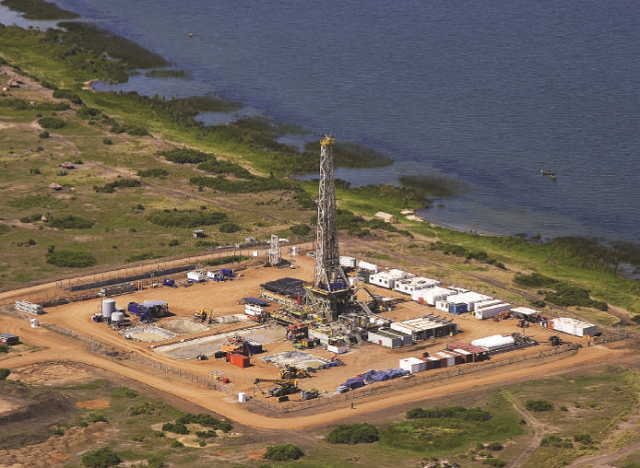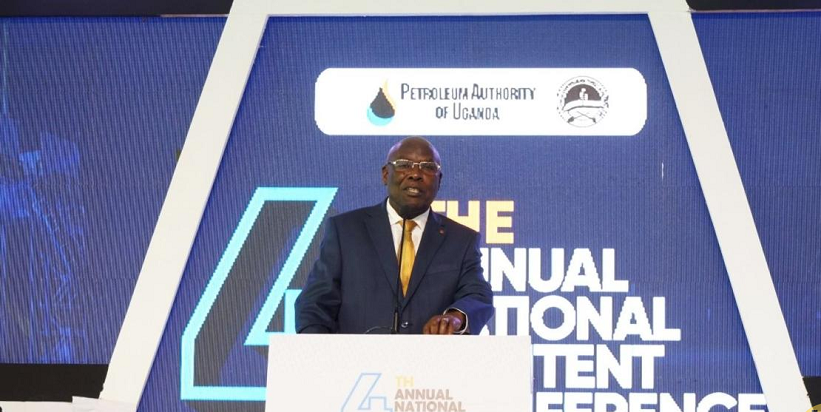New companies intending to invest in the exploration of Uganda’s oil and gas industry starting next year, have embarked on the tour of the oil fields that the government has put up on the market.
The four companies shortlisted for the final round of the second competitive oil bidding round are Total E & P Activites Petrolieres, France; DGR Global Limited, Australia; Uganda National Oil Company Limited (UNOC) Uganda and a joint venture of PetroAfrik Energy Resources East Africa Ltd, Uganda and Niger Delta Petroleum Resources Ltd, Nigeria.
Chinese company CNOOC, which is already involved in the current activities, will partner with Total following the short-listing, the companies have been allowed to move around the block for further details before they decide on whether to continue and which areas to bid for.
Six countries had applied for qualification to bid for the licenses, but only four were successful. Hanny Malinga, the Acting Director Geological Survey and Mines and the Ministry of Energy and Mineral Development confirmed the development.
Frank Mugisha, Acting Commissioner Petroleum Exploration, Development and Production Department says that after the tour of the five blocks, the companies will have up to 30th June to submit their applications, without any further deadline extension.
The five blocks on offer in this second licensing round are Avivi, Omuka, Kasuruban, Turaco and Ngaji in the Albertine Graben, all described as highly prospective. After the evaluations of the bids, the government will enter into another round of negotiations with the companies as part of the transparency policies, also aimed at avoiding future disagreements.
“The next phase is to negotiate with the companies, before the signing of the oil production sharing agreements,” says Robert Kasande, the permanent secretary at the ministry.
The blocks: Aviv which is Block 1, is in the northernmost in Moyo District covering 1,026km2. In 2013, despite data showing there is a petroleum system, Neptune Petroleum which was exploring the area hit three dry wells and gave up.
Omuka, which is Block 2 is also located in Buliisa District covering 750sq km, and like Aviv, three dry wells were drilled in the block. Kasurubani, which is Block 3 and is also located in the Buliisa area, was drilled by Tullow and oil was found, but the company relinquished the block to the government, with Tullow Oil not sure it was as viable as earlier expected. This is also the biggest of the blocks covering 1,285Sq Km.
Turaco or Block 4 in the Bundibugyo-Ntoroko area, is the smallest of the blocks at 635km2, underwent initial explorations and, basing on seismic and ground gravity and magnetic data, Heritage Oil commenced drilling and some hydrocarbons were encountered.
However, these were contaminated with carbon dioxide and the Petroleum Authority, Uganda says that much as there is technology to process produce this gas, at the time, the focus was only on oil. Heritage returned the block to government. Ngaji (Block 5) which covers 1,230Sq km is located in Mitooma District at the shores of Lake Edward.
Acting Commissioner, Frank Mugisha describes it as “a bit controversial” because it is located in a highly protected conservation area, and borders the Democratic Republic of Congo. “It would be very important for whoever gets the contract to explore for oil in this area to work closely with stakeholders to ensure the environment is protected,” he says.
This area is also near the Virunga Conservation Area in the DR Congo, and is one of the reasons civil society is opposed to oil and gas activities there. But Malinga says the much as Uganda has to protect the ecosystem there from the effects of the activities, the area should not be attached to the Virunga area, more than 100 km away.
Malinga says investment in the sector is highly risky and anything that causes uncertainty can lead the investors to go away, if they sense high chances that they will not recover their money. The successful companies from the second round of licensing are expected to be awarded the contracts to carry out exploration, by the December 31 this year.





